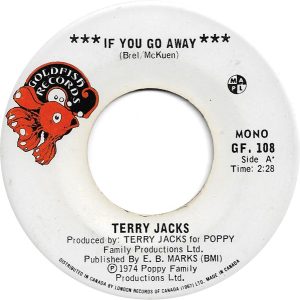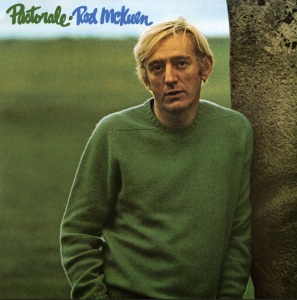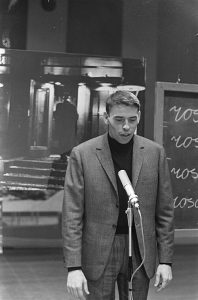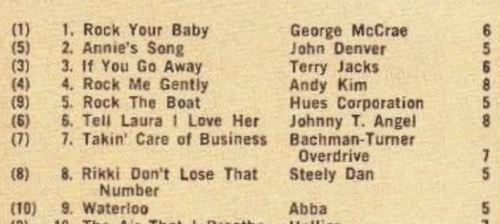#53: If You Go Away by Terry Jacks
City: Ottawa, ON
Radio Station: CFGO
Peak Month: July 1974
Peak Position in Ottawa ~ #3
Peak position in Vancouver ~ #15
Peak Position on Billboard Hot 100 ~ #68
YouTube: “If You Go Away”
Lyrics: “If You Go Away”
Terrence Ross Jacks was born in Winnipeg, Manitoba, in 1944. During his career as a recording artist he became a household name and recognized as a singer, songwriter, record producer and environmentalist. His family moved to Vancouver in 1961 and he formed a band named The Chessmen along with local guitarist, Guy Sobell. The Chessmen had four singles that made the Top 20 in Vancouver, two which were double-sided hits. These included three Top Ten hits: “Love Didn’t Die”, “The Way You Fell” and “What’s Causing This Sensation”. In 1966 Terry Jacks met Susan Pesklevits on a local CBC music show called Let’s Go.
Susan Pesklevits met Jacks after she had him recommended to her by a friend who knew she was looking for a rhythm guitarist. Pesklevits needed a rhythm guitarist to help with her upcoming gig at the Elks Club in Hope, British Columbia, in early September 1966. They were married in 1967 and she became Susan Jacks. In 1967, along with Craig McCaw who had been a member of the Kelowna band The Shadracks, they formed a trio called Powerline. They changed their name to The Poppy Family and Craig subsequently sought out a young tabla player in Vancouver named Sawant Singh. Terry and Susan Jacks agreed to have Singh join The Poppy Family.
On June 26, 1968, the Poppy Family gave a concert at the Village Bistro in Vancouver. They returned to the venue to perform on November 26, 27 and 28th. They also gave a concert in Vancouver at the Kiview Boys Club on November 10, 1968. In the fall of 1968, the Poppy Family had a regional hit with “Beyond The Clouds”. It climbed to #2 for two weeks on the CKLG Boss 30 in November ’68.
On January 23rd, February 28th, and on March 14, 1969, the Poppy Family gave concerts at the UBC Student Union building in Vancouver. Their follow up in 1969 was a gentle anti-racist, pro-environmental, pro-marijuana legalization tune titled “What Can The Matter Be”. It appeared on the CKLG Boss 30 the week of March 21, 1969.
The Poppy Family’s next single, “Which Way Is Going Billy?” became an international hit. Terry Jacks won a Juno Award for this recording. In January 1970 the Poppy Family topped the Vancouver pop chart for two weeks on CKLG with “That’s Where I Went Wrong”.
Then in June 1970 Terry Jacks debut solo single, “I’m Gonna Capture You“, entered the record survey on CKLG. It climbed to #2 in Vancouver the following month, kept out of the number-one spot by Three Dog Night’s “Mama Told Me Not To Come”.
In 1971 the Poppy Family topped the Vancouver Top 30 with “I Was Wondering”, while the B-side “Where Evil Grows” peaked on CKVN at #12. The group had another Top Ten hit in Vancouver with a cover of the Wildweeds “No Good To Cry” in the winter of 71-72. And in the spring of ’72, the group had another Top Ten hit in Vancouver “Good Friends“. And on May 24, 1972, the Poppy Family gave a concert at the Chilliwack Coliseum in Chilliwack – about a 90 minute drive east of Vancouver. The hits kept coming as Terry Jacks released his second solo single in August ’72, the environmentalist tune “Concrete Sea”.
At the end of 1972, Terry Jacks released a cover of the Buddy Holly “I’m Gonna Love You Too“. While Susan Jacks enjoyed performing live, Terry Jacks wasn’t interested in touring. As a consequence, the Poppy Family lost the momentum they had briefly achieved internationally and their career was hampered. The professional relationship began to unravel and so did the marriage.
Terry Jacks is best known for his 1974 hit song “Seasons In The Sun”. Jacks sone is an English-language adaptation of the 1961 song “Le Moribond” by Belgian singer-songwriter Jacques Brel with lyrics rewritten in 1963 by American singer-poet Rod McKuen. The lyrics portray a dying man’s farewell to his loved ones.
In an interview he recalls what happened when the “Seasons In The Sun” became a hit. “…at the time Sonny & Cher had the top show. They’d phoned me, because I didn’t want to do it. The producer got quite pissed off. He says, ‘Well, how do you expect to sell any records if you don’t do our show?’ So, anyway, I didn’t do it. So then Dick Clark, he had the big music show…American Bandstand... His producer phoned me and they wanted me to do it. I said, “Golly, I just don’t want to do anything like that.” In fact, I took off and went scuba diving down in the South Pacific for two months.” When Jacks got back to Canada Dick Clark phoned him and the singer agreed to appear on American Bandstand because no one says ‘no’ to Dick Clark. Jacks appeared on American Bandstand on February 9, 1974.
In 1974, Jacks got royalties from “Seasons in the Sun” which sold over 11.5 million copies. Terry Jacks bought a boat and spent a lot of time sailing between Vancouver and Alaska. Feeling committed to the preservation of the ocean and clean air, Jacks took on Canadian companies who were polluting the waters and the atmosphere. For 12 years, he left music behind to protest these companies through legal actions. Jacks recalled in an interview, “I met with one of the CEOs of one of the big pulp mills and I had a big picture of one of his mills. I had a picture of my little girl in the smoke that was coming out of the mill, and I showed it to him. I said, ‘I don’t want this for my little girl, and you’re breaking the permits.’”
His followup single from the Seasons In The Sun album was “If You Go Away”.

“If You Go Away” was written by Jacques Brel and Rod McKuen (English translation).
Rod McKuen was born as Rodney Marvin Woolever in Oakland (CA) in 1933. He had “two birth certificates, each giving conflicting dates and spelling his father’s name different ways.” He never knew his biological father, who had left his mother. Sexually and physically abused by relatives, raised by his mother and stepfather, who was a violent alcoholic, McKuen ran away from home. He drifted along the West Coast, supporting himself as a ranch hand, surveyor, railroad worker, lumberjack, rodeo cowboy, stuntman, and radio disc jockey, always sending money home to his mother.
At some point, he began using the name “McKuen” as the best approximation of what he thought his father’s name was. His mother told him that his father’s name was “Mac” McKuen (although she was unsure how it was spelled). At one point later in life, McKuen hired a detective agency to try to locate his father. Per The New York Times, “Whether or not he found his father, at least he (and the detectives) found a man 10 years deceased who satisfies him — Rodney Marion McKune, a lumberman in Utah, twice married (the last time to a woman 20 years his senior), who at the close of his life was an iceman in Santa Monica, Calif., 20 miles from where McKuen was living. No relative of this McKune remembers him taking a trip from Utah to Oakland that summer of 1932 when the author was conceived, but a Mormon churchman remembers taking a trip there with him in 1931 or 1932.”
McKuen worked as a newspaper columnist and propaganda script writer during the Korean War. He settled in San Francisco, where he read his poetry in clubs alongside Beat poets like Jack Kerouac and Allen Ginsberg. He began performing as a folk singer at the famed Purple Onion. Over time, he began incorporating his own songs into his act. He was signed to Decca Records and released several pop albums in the late 1950s. McKuen also appeared as an actor in Rock, Pretty Baby (1956), Summer Love (1958), and the western Wild Heritage (1958). He also sang with Lionel Hampton’s band. In 1959, McKuen moved to New York City to compose and conduct music for the TV show The CBS Workshop. McKuen appeared on To Tell The Truth on June 18, 1962, as a decoy contestant and described himself as “a published poet and a twist singer.

In the early 1960s, McKuen moved to France, where he first met the Belgian singer-songwriter and chanson singer Jacques Brel. McKuen began to translate the work of this composer into English, which led to the song “If You Go Away” based on Brel’s “Ne me quitte pas”.
Jacques Romain Georges Brel was born in suburban Brussels, Belgium, in 1929. In school he excelled in creative writing and began to play guitar at age 15 in 1944. He did poorly in school otherwise and went to work at a cardboard factory in 1947. The following year he enlisted in the Belgian Air Force for compulsory military service. He subsequently worked on the cabaret circuit in France. In 1952 he performed on a local radio station for the first time. He pursued his lyrical talents and was signed to Philips Records in 1953. His songs got the attention of Juliette Gréco. He toured in northern Africa and around France. He shared the stage with Maurice Chevalier, Michel Legrand, Zizi Jeanmaire, Françoise Dorin, Suzanne Gabriello, Darío Moreno, Philippe Clay, Catherine Sauvage, Serge Gainsbourg, Charles Aznavour, and many others. He would release 14 studio albums and nearly forty singles. His songs have been covered by over a hundred recording artists and translated into at least 95 languages.

Jacques Brel performing (1963)
After a grueling concert schedule across Europe, Africa and the North America, Jacques Brel gave his final concert in 1967. Between 1967 and 1973 he appeared in eleven films. In 1956, he wrote the script for the film short La grande peur de Monsieur Clément. In 1968 he wrote the musical Jacques Brel Is Alive and Well and Living in Paris. As well, he wrote the screenplay for the 1971 film Franz, and for the 1973 film Le Far West.
“If You Go Away” is a sad but hopeful ballad. The lyrics are told from the perspective of someone telling their lover how much they would be missed if they left. This is described in vivid, hyperbolic terms, such as “there’ll be nothing left in the world to trust“. If the lover stays, the narrator promises them both devotion and good times (“I’ll make you a day / Like no day has been, or will be again“). Some lines show that the narrator is speaking to the lover as they are already leaving, or considering doing so (“Can I tell you now, as you turn to go…“). The lines “If you go, as I know you will” and later “…as I know you must” make clear that despite the narrator’s protests, the lover’s leaving is inevitable.
In the original French version by Jacques Brel, the singer begs for his lover not to leave him and is more supplicant and almost self-humiliating (the title “Ne me quitte pas” translates as “Do not leave me”). The last image of the French version is significant: although the McKuen version has lyrics that come close to the original sentiment, the French lyrics are far bleaker (as is the song in general): “Let me become the shadow of your shadow, the shadow of your hand, the shadow of your dog” (lit. translation of the original) as opposed to “I’d have been the shadow of your shadow if I thought it might have kept me by your side” (English lyrics).
The English version omits a section of the original version in which the singer begs his lover to give their relationship a second chance, using examples derived from the natural world: “I will tell you of those lovers who saw their hearts catch fire twice;” “Fire has often been seen gushing out of an ancient volcano we thought too old“; “There are, people say, burnt lands that produce more wheat than the best of Aprils“.
Jacques Brel had a cancerous tumor and died of a pulmonary embolism in 1978 at the age of 49. The Washington Post wrote at the time of his death, “His last words to his friends around his bedside were: “If you really love me, shut up. Don’t talk about me anymore.” And by asking to be buried in the South Pacific, his death-bed wish, he ensured that there will not be the tens of thousands who tramp around the Memphis mansion of Evis Presley or crush the flowers around the grave of Claude Francois. Jacques Brel will be alone.” At least eleven statues of Jacques Brel can be found across Belgium and France, over 15 streets named after him in different towns, as well as stadiums, libraries and neighborhoods. A limited Belgian 10 Euro silver coin was issued in memory of Brel’s 40th anniversary of his death in 2018.
Over the decades Rod McKuen published 29 books of poetry. In addition, he published eight books of prose. He also recorded over one hundred albums (studio and live). He died at the age of 81 in 2015 of pneumonia.
“If You Go Away” climbed to #3 in Ottawa, #7 in Toronto, #9 in Hamilton (ON), #10 in Cleveland, #11 in Utica (NY), and #15 in Vancouver. Jacks’ version reached #8 in the UK, #45 in Canada, and #63 in Australia.
Damita Jo recorded “If You Go Away” in 1966 and the single reached #68 on the Billboard Hot 100. Jacks’ cover of the song also reached #68 on the Hot 100 in 1974.
“If You Go Away” has also been covered by Marc Almond, Shirley Bassey, Acker Bilk, Glen Campbell, Ray Charles, Neil Diamond, Sheena Easton, Bobby Goldsboro, Richard Hayman, Al Hirt, Shirley Horn, Stan Getz, Julio Iglesias, Jack Jones, Tom Jones, Eartha Kitt, James Last, Cyndi Lauper, Brenda Lee, Nana Mouskouri, Freda Payne, Joaquin Phoenix, Sylvia Syms, Sandler & Young, The Seekers, Frank Sinatra, Dusty Springfield, Jackie Trent, Dottie West, and Georghe Zamfir, among others. It has been covered by recording artists in Belgium, Denmark, France, Greece, Iceland, Iran, Israel, the Netherlands, the Philippines, Spain, Sweden, and more.
Subsequently, Jacks released “Rock N’ Roll (I Gave You All The Best Years Of My Life)”. In 1974 Terry Jacks won a Juno Award for Best Male Vocalist.
Between 1975 and 1987 Jacks released nine more singles. Only one of these, “Christina”, made the local pop charts in Vancouver.
After the mid-70s, Terry Jacks withdrew from the music industry. He got remarried and became a father. In 1985 he formed Environmental Watch. Jacks also produced a number of documentary short films over the following decades on the environment with titles The Faceless Ones, The Tragedy of Clearcutting, The Southern Chilcotin Mountains and The Warmth of Love (The Four Seasons of Sophie Thomas).
Jacks love of nature never wavered. He eventually moved to Haida Gwai on the northwestern coast of British Columbia, while also maintaining a home on British Columbia’s Sunshine Coast in scenic Madiera Park. The unincorporated community is adjacent to Pender Harbour where Joni Mitchell lives.
On July 9, 2014, the Poppy Family performed in concert at the Fox Cabaret in Vancouver. And three days later on July 12th, they appeared at the Khatsahlano Street Party on Vancouver’s West 4th Avenue.
In an interview with Songfacts.com in 2014, Terry Jacks reflected on the music industry and recording artists. “…so many of these guys, they get into too many evil things. Too many wives, too much wine, too much alcohol, too much drugs. You get wrapped up and you’ve got so many people; they’ve got agents and managers and everything. I never had to answer to anybody. I answered to myself. I did what I wanted to do and sure, I could have probably made millions of dollars, but I didn’t really care. I got everything I wanted. The nice boat, the nice car. I had the same car for 44 years. I just got a new car, finally. I had a Mercedes 280SL, a nice little sports car. When I got the money I bought that car, and I just kept it. And then my boat, Seasons in the Sun, I just sold it last year. I’m getting too old for the wild. And I had a beautiful ranch, I had to give that up in the marriage. I’m happy. I think the less you’ve got, the happier you are. One of my sayings is on my fridge. It says, ‘Simplicity.’ And then it says, ‘I think everybody should get rich and famous and do everything they ever dreamed of, so they can see that it’s not the answer.’”
In 2016 Terry Jacks suffered two strokes.
October 15, 2025
Ray McGinnis
References:
John Mackie, “The Many Seasons of B.C. Singer Terry Jacks,” Vancouver Sun, April 1, 2016.
Carl Wiser, “Terry Jacks Seasons In The Sun,” Songfacts.com, March 6, 2014.
Terry Jacks bio, Canadian Bands.com.
Terry Jacks bio, The Canadian Encyclopedia.ca.
Dick Clark, “Terry Jacks, Al Wilson guest stars,” American Bandstand, ABC, February 9, 1974.
Pierre Salinger, “Jacques Brel Est Mort: He Needed a Note of Music To Make His Words Sing,” Washington Post, October 14, 1978.
Hillel Italie, “Rod McKuen, top-selling poet and performer, dies at 81,” Richmond Times-Dispatch, January 30, 2015.

CFGO 1440-AM Ottawa Top Ten | July 15, 1974

Terry and Susan Jacks had great careers. I liked them as The Poppy Family as well.